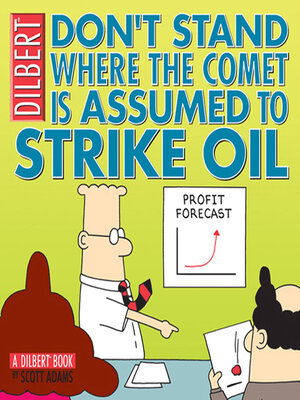Don't Stand Where the Comet Is Assumed to Strike Oil
ebook ∣ A Dilbert Book · Dilbert
By Scott Adams

Sign up to save your library
With an OverDrive account, you can save your favorite libraries for at-a-glance information about availability. Find out more about OverDrive accounts.
Find this title in Libby, the library reading app by OverDrive.



Search for a digital library with this title
Title found at these libraries:
| Library Name | Distance |
|---|---|
| Loading... |
Gallows humor is a survival skill for Dilbert and his coworkers in the series that makes "the dronelike world of Kafka seem congenial" (The New York Times).
Why is Dilbert such a phenomenon? People see their own dreary, monotonous lives brought to comedic life in the ubiquitous strip. In the twenty-third collection of Scott Adams' tremendously popular series, Don't Stand Where the Comet Is Assumed to Strike Oil, suppressed and repressed workers everywhere can follow the latest developments in the so-called careers of Dilbert, power-hungry Dogbert, Catbert, Ratbert, the pointy-haired boss, and other supporting—but don't you dare call them supportive—characters. Each "funny because it's true" scenario bears an uncanny, hysterical, and sometimes uncomfortable similarity to cubicle-filled corporate America.
"Once every decade, America is gifted with an angst-ridden anti-hero, a Nietzschean nebbish, an us-against-the-universe everyperson around whom our insecurities collect like iron shavings to a magnet. Charlie Chaplin. Dagwood Bumstead. Charlie Brown. Cathy. Now, Dilbert." —The Miami Herald
Why is Dilbert such a phenomenon? People see their own dreary, monotonous lives brought to comedic life in the ubiquitous strip. In the twenty-third collection of Scott Adams' tremendously popular series, Don't Stand Where the Comet Is Assumed to Strike Oil, suppressed and repressed workers everywhere can follow the latest developments in the so-called careers of Dilbert, power-hungry Dogbert, Catbert, Ratbert, the pointy-haired boss, and other supporting—but don't you dare call them supportive—characters. Each "funny because it's true" scenario bears an uncanny, hysterical, and sometimes uncomfortable similarity to cubicle-filled corporate America.
"Once every decade, America is gifted with an angst-ridden anti-hero, a Nietzschean nebbish, an us-against-the-universe everyperson around whom our insecurities collect like iron shavings to a magnet. Charlie Chaplin. Dagwood Bumstead. Charlie Brown. Cathy. Now, Dilbert." —The Miami Herald







